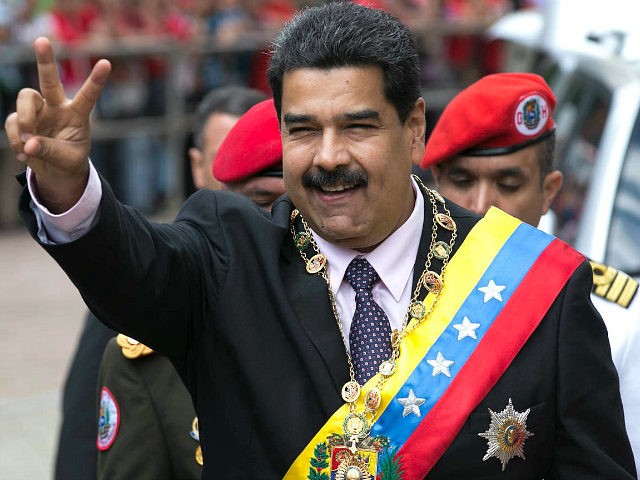Venezuela’s socialist dictator Nicolás Maduro appears to be attempting to ingratiate himself with his American counterpart Donald Trump, praising the president’s joint address to Congress on Tuesday as “the first time I hear a U.S. president speak of the struggle against drug trafficking.”
Maduro described some of the statistics President Trump provided in his speech as “very worrisome,” including the figure of 42 million Americans living below the poverty line and “record levels of criminal violence.” He highlighted as significant President Trump’s emphasis on combatting drug addiction from the United States, particularly in poorer communities.
Maduro’s compliments follow a month in which the U.S. Treasury Department designated his vice president, Tareck El Aissami, a “Specially Designated Narcotics Trafficker” for his ties to various cocaine-trafficking outlets and President Trump personally welcomed Lilian Tintori, wife of Venezuelan political prisoner Leopoldo López, to the Oval Office.
“I was watching President Donald Trump’s speech last night,” Maduro said on national television on Wednesday. “I followed every detail he said, I am still analyzing, but he said some very worrisome things.”
“For the first time I hear a U.S. president speak about the struggle against drug trafficking, with curing the consumers [of drugs] as a fundamental aspect [of that struggle],” Maduro said. “It is very interesting that [Trump] recognize this grave public health problem.”
In his speech Tuesday night, President Trump promised Congress that “our terrible drug epidemic will slow down and ultimately, stop.”
“I have further ordered the Departments of Homeland Security and Justice, along with the Department of State and the Director of National Intelligence, to coordinate an aggressive strategy to dismantle the criminal cartels that have spread across our Nation,” Trump announced. “We will stop the drugs from pouring into our country and poisoning our youth — and we will expand treatment for those who have become so badly addicted.”
Maduro nonetheless highlighted that he and President Trump “have differences” but reiterated that he wished to engage in respectful diplomatic relations with the White House, a departure from his regular warnings that President Barack Obama was preparing a ground invasion of Venezuela during his tenure.
Among those differences is the fact that Maduro employs a known high-level drug trafficker as his second-in-command. According to the U.S. Treasury Department, El Aissami has cooperated with “groups as varied as the Mexican Zetas cartel and Hezbollah.” Reports — published prior to the Treasury using the Drug Kingpin Act to freeze El Aissami’s U.S. assets — accused him of, among other crimes, recruiting Latin American Muslims to join Hezbollah and running his own cocaine trafficking outfit the Cartel de los Soles.
Diosdado Cabello, the Socialist Party’s minority leader in Venezuela’s National Assembly, is widely believed to be the Cartel de los Soles’s boss. While Maduro himself has never been accused of drug trafficking, reports have indicated he has funded political campaigns with drug money generated by Cabello and El Aissami.
El Aissami responded to the Treasury sanctions with a full-page ad attacking the United States in the New York Times.
In addition to sanctioning El Aissami, the Trump administration has called for the release of all political prisoners under Maduro’s chavista dictatorship. In February, Trump welcomed Tintori, an anti-socialist activist and wife of Popular Will party leader Leopoldo López, to the White House, publishing a photo standing next to her, Vice President Mike Pence, and Senator Marco Rubio on Twitter. “Venezuela should allow Leopoldo Lopez, a political prisoner & husband of @liliantintori (just met w/ @marcorubio) out of prison immediately,” the president wrote on Twitter.
Maduro’s government sentenced López to 14 years in prison for organizing a peaceful anti-government protest in February 2013, convicting him under charges of terrorism and inciting violence.

COMMENTS
Please let us know if you're having issues with commenting.